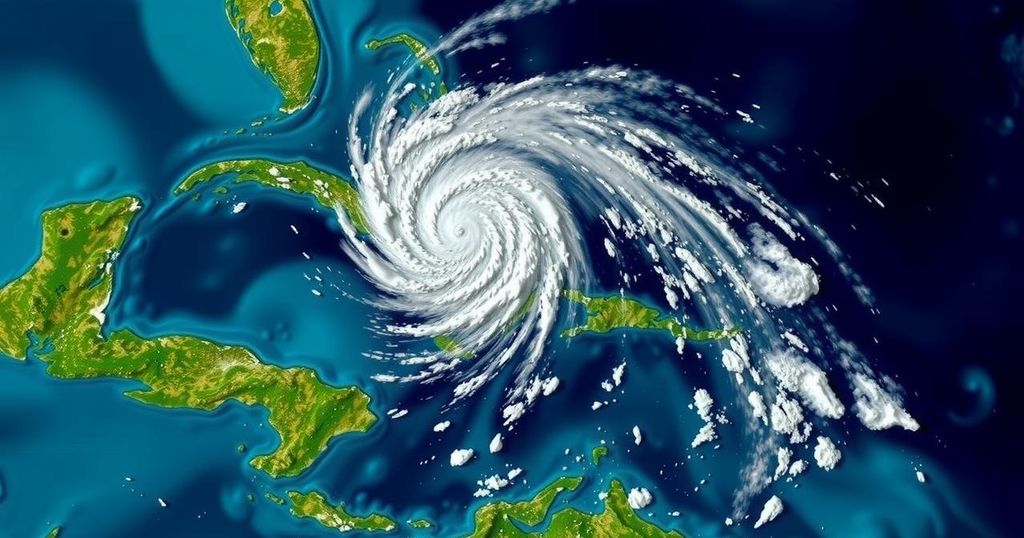Tropical Storm Oscar Weakens After Causing Fatalities in Cuba
Tropical Storm Oscar has weakened after wreaking havoc in Cuba, where it made landfall as a Category 1 hurricane, leading to seven fatalities and heavy flooding. Its remnants are now approaching the Bahamas with expectations of additional rainfall. The storm surprised meteorologists with its intensity and is part of an active Atlantic hurricane season.
Tropical Storm Oscar has dissipated as it progresses toward the Bahamas following a destructive impact in Cuba, where it made landfall as a Category 1 hurricane, resulting in the tragic loss of at least seven lives and significant flooding. The storm’s remnants were situated approximately 75 miles (115 kilometers) east-southeast of Long Island, Bahamas, with sustained winds weakened to 35 mph (55 kph) and moving northeast at 12 mph (19 kph). Forecasters anticipate that the remnants will bring an additional four inches (10 centimeters) of rain to the southeastern Bahamas and the Turks and Caicos Islands. Oscar holds the record as the smallest hurricane documented, featuring a wind field of only about 6 miles (10 kilometers). Its intensification into hurricane status took meteorologists by surprise as the storm initially hit Grand Inagua Island in the Bahamas on Saturday, followed by a second landfall in eastern Cuba on Sunday before retracing its path back toward the Bahamas. Michael Lowry, a hurricane specialist, remarked on the rarity of witnessing a significant forecasting failure when commenting on Oscar’s unexpected strength, noting that predictive models did not forecast its hurricane development. Cuba has faced substantial challenges due to Oscar, notably with at least 15 inches (38 centimeters) of rainfall recorded in parts of eastern regions leading to flooding and landslide risks. The fatalities occurred in Guantánamo province. The timing of Oscar’s impact coincided with Cuba’s ongoing recovery from a massive power outage, which had led to protests and stern government warnings against unrest. Oscar was the 15th named storm and the 10th hurricane of the ongoing Atlantic hurricane season, which commenced on June 1 and will conclude on November 30. Long-term models hint at the possibility of another storm developing in the central Caribbean within the coming week, as forecasters emphasize the heightened activity anticipated in the Atlantic due to record-high ocean temperatures. In a related development, Hurricane Kristy has strengthened in the eastern Pacific and is anticipated to remain over open water, currently posing no threat to land. As of Tuesday, Kristy is located 590 miles (950 kilometers) west-southwest of Acapulco, Mexico, with maximum sustained winds recorded at 75 mph (120 kph).
Tropical Storm Oscar has emerged as a notable weather phenomenon during the Atlantic hurricane season. This storm developed unexpectedly, confounding meteorologists with its rapid intensification into a hurricane despite predictions to the contrary. The destructive path it carved through Cuba resulted in severe impacts, including fatalities and extensive flooding, while simultaneously affected power outages highlighted the country’s infrastructural vulnerabilities. This hurricane season has been characterized by unusually high ocean temperatures, prompting predictions of above-average storm activity, thereby accentuating the ongoing risks associated with tropical storms in the region.
In conclusion, Tropical Storm Oscar has transitioned into its remnants after causing significant destruction in Cuba, resulting in the loss of seven lives and extensive rainfall that threatens further flooding and landslides. It serves as a stark reminder of the unpredictability of hurricanes, as well as the vulnerabilities faced by nations like Cuba in terms of infrastructure and storm preparedness. Furthermore, the ongoing Atlantic hurricane season is projected to remain active, with potential for additional storm developments.
Original Source: gvwire.com




Post Comment